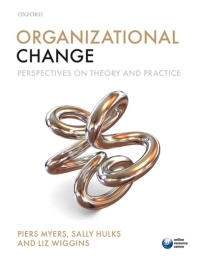Between 2003 and 2006, shares in HBOS rose by 53 per cent, far ahead of most of
Question:
Between 2003 and 2006, shares in HBOS rose by 53 per cent, far ahead of most of its competitors.
The bank had a very strong sales culture, with even junior bankers receiving signifi cant bonuses.
Some people in the bank became concerned that the bank was ‘going too fast’, taking excessive risk because of the sales-driven culture, and without the appropriate balance of systems and controls. However, few people wanted to speak out because of fear of being branded troublemakers and concern that doing so would jeopardize them receiving large bonuses. The reward power of leaders thus quashed any emergent resistance and made it diffi cult for any coalition to form to challenge or change the culture or risk management practices. Paul Moore, head of global risk at HBOS from 2002 to 2005, was responsible for ensuring that the executives complied with the regulations of the Financial Standards Authority. He did speak out. He was subsequently dismissed: an example of a coercive approach to dealing with resistance and undoubtedly intended to silence any other resistance. Moore received a settlement for unfair dismissal under the Public Interest Disclosure Act 1998 (the ‘Whistleblower Act’), but broke his gagging order in February 2009 when the bank nearly collapsed during the credit crisis, only to be saved with a taxpayer-funded bailout and a merger with the Lloyds Banking Group.
Moore gave evidence to the Treasury Select Committee investigating what had happened at HBOS. He paints an insider’s view of the power of the guiding coalition and senior executives’ use of politics to prevent changes to the status quo, which was making them personally very rich.
Among the many incidents he describes are the following.
1. The company secretary failed to minute crucial comments he made at a formal board meeting, reporting his investigation that the sales culture at HBOS had got out of control.
2. He was strongly reprimanded by a board member for tabling the full version of a critical report at a group audit committee meeting, which made it clear that the systems and controls, risk management, and compliance were inadequate to control the ‘over-eager’ sales culture.
‘Mysteriously, this had been left out of the papers even though I had sent it to the secretary’, writes Moore (Comment 3.15).
3. After Moore was dismissed, an ex-sales manager who had no experience of risk management was appointed as group risk director.
4. A personal friend of the HBOS chairman was appointed to be the chairman of the risk control committee. Moore recounts that this individual ‘admitted to me that . . . they met quite often socially. Of course, he was supposed to be challenging (the Chairman) . . . He obviously had no technical competence in banking or credit risk management to oversee such a vital governance committee’ (Comment 3.15).
Questions 1. What types of power are being used by HBOS executives in this account, with what purpose?
2. In 2005, what would you have advised Moore to do to improve his chances of altering risk management practices at HBOS?
3. What lessons about power, politics, and resistance, in relation to organizational change, do you draw from this study?
Step by Step Answer:

Organizational Change Perspectives On Theory And Practice
ISBN: 9780199573783,9780191512902
1st Edition
Authors: Piers Myers; Sally Hulks; Liz Wiggins




